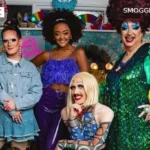Drag Queen Story Hour, LGBT+
Drag Queen Story Hour at Britain’s Got Talent
In 2023, RuPaul Andre Charles, drag queen and host of the TV show RuPaul’s Drag Race, posted a fierce defense of drag on his Instagram page. “Drag queens,” he boasted, “are the Marines of the queer movement.”
Indeed they are, and RuPaul’s boast was something of an admission. It is precisely because drag queens are “the Marines of the queer movement” that so many people object to drag shows for children in libraries, schools, and family-friendly events.
RuPaul’s statement also gives essential cultural context to why drag queens suddenly seem to be everywhere.
As Lauren Smith of Spiked wrote recently, “Alien visitors to Earth might be forgiven for thinking that something like 10 per cent of the U.K. population are drag queens. After all, how else could you explain the sheer amount of airtime and column inches that the BBC has devoted to this relatively niche ‘LGTBQ+’ subculture?”
Smith noted just a few examples available on BBC iPlayer, including RuPaul’s Drag Race UK, Canada’s Drag Race, RuPaul’s Drag Race Down Under, Jamie: Drag Queen at 16 and God Shave the Queens, and a drag queen appearance on Dr. Who. Despite rock-bottom ratings, the BBC also renewed an LGBT-themed show called Smoggie Queens about a bunch of LGBT folks who live together and do LGBT things, including drag.
Well, in April, the “Marines of the queer movement” came to Britain’s Got Talent with a performance by drag queen Jasmine Rice (real name: Chris, of New York City). The crowd roared at the performance of the “Opera Queen”; the judges took turns gushing, with one of them informing him that “you look stunning to me”; another told the man in garish feminine makeup and a dress that he looked “fantastic” and emphasized “there’s nothing not to like about this act.”
Judge Amanda Holden assured him he looked amazing, and even engaged in a bit of girl talk, insisting that she needed “to know who made the frock as well.” In case you didn’t get the message: Cross-dressing is fantastic.
The famously critical Simon Cowell asked him why he came on the show. Rice responded, “Well, I was getting a lot of rejection because of how I presented myself, especially in the opera world, being feminine and being fierce was not really taken with embrace.” Cowell asked, “So you thought here it would be the opposite?” “Yeah,” Rice responded. The four judges promptly all voted yes.
If you’re wondering whether it’s a bit of a stretch to note the political nature of this display, I’d point out that the LGBT activist group GLAAD certainly thinks it is. Rice spoke to GLAAD to explain why his performance was so important:
This wasn’t just a performance. It was a protest, a celebration, and a story all woven in one.
“I fell in love with opera because of how grand it was,” she shared.
“In the beginning of my drag career I tried to keep the two separate because the opera world was something serious and proper and drag was just late-night fun entertainment. However, I came to realize that they are both art and deserve the same respect.”
That’s the line that lingers — they both deserve the same respect.
Jasmine isn’t asking for permission, she’s claiming her space. And the timing couldn’t be more powerful as in the U.S. and around the world, drag is being politicized, banned, and mischaracterized.
Indeed, GLAAD’s headline noted that with Rice’s performances he “takes drag to the global stage.” Those of us who point out what is going on aren’t starting a culture war — we’re merely observing one that is taking place. And as RuPaul noted, drag queens are the “Marines of the queer movement.” They’re not hiding.








